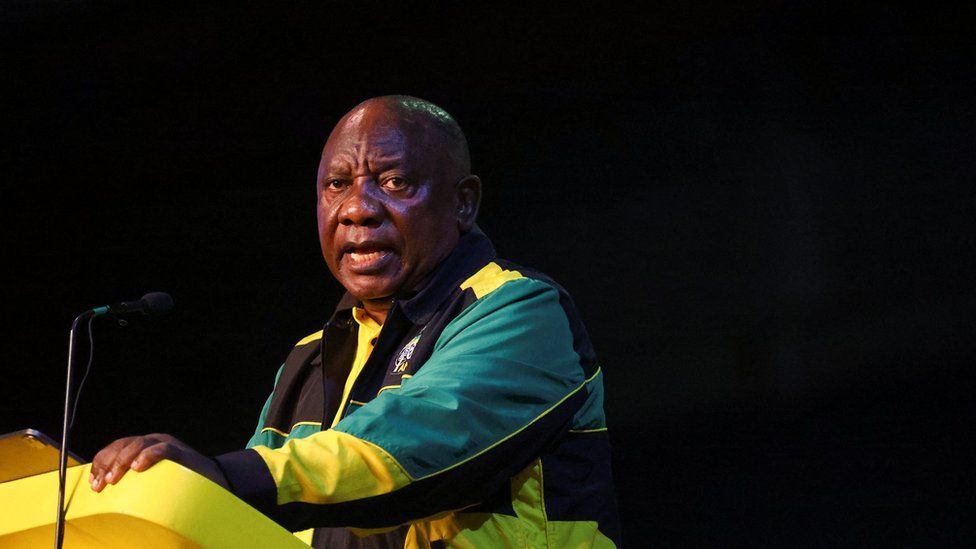By Khulile Thwala and Sifiso Sibandze
South African President Cyril Ramaphosa emerged from a ruling party electoral conference with a stronger mandate. He, however, still has to overcome a series of political hurdles to tackle a daunting economic to-do list.
The country is gripped by an energy crisis that’s idling businesses for six or more hours a day, the crumbling freight-rail system prevents key exports from getting to ports and municipalities struggle to provide basic services.
With South Africans battling with the worst power cuts, Ramaphosa’s performance has been very disappointing, and the outcome of his economic reforms has not yet been felt in the real economy. Analysts and business leaders are of the view that losing him was frightening for markets, investors, and the business community.
Against this backdrop, economists feel having him back as the President will ensure the continuation of his business policies. Ramaphosa is believed to be engendering confidence in the business and international community and therefore, it could have been calamitous for the economy which is slowly picking up if there was going to be an arrival of Dr Zwelini Mkhize with his new policies.
Based on the increased economic integration of South Africa’s economy with the other members of the Common Monetary Area (CMA), Lesotho, Namibia and Eswatini, the coming of a new President was going to have a huge negative knock-on effect on these three economies.
We need to understand that the interrelatedness of South Africa’s economy with Eswatini, Lesotho and Namibia, warrants increased exposure to shocks, either negative or positive. On the positive side, countries benefit from trading with fast-growing and relatively rich countries whereas, on the negative side, countries are affected detrimentally when trading with countries that are in recession and relatively poor.
A common view in Africa is that SA is an engine of growth in the entire African continent and Africa’s output is envisaged to be closely correlated with movements in SA. Based on this premise, a slowdown in SA’s economic growth is likely to retard growth performance in the CMA countries due to the close linkages.
According to SA media reports, Ramaphosa’s re-election has seemingly eased market uncertainty about the ANC’s policy trajectory, sending the Rand firmer to E17.30 against the US dollar from about E17.70 overnight. This further strengthens the Lilangeni, which is pegged to the Rand.
Mail & Guardian recently reported that investors signalled their support for a Ramaphosa presidency after the release of parliament’s section 89 panel report on the Phala Phala scandal and rumours the president may resign. The Rand tumbled four per cent and bond yields spiked to their highest levels since 2020.
Ramaphosa’s re-election is said to strongly push a reform agenda which will see major positive changes in SA’s political trajectory. Eswatini’s economic turnout is heavily reliant on SA, resulting in major changes affecting that country directly influencing the kingdom. SA being one of Eswatini’s major trade partners makes it even more significant that a political change will influence the kingdom’s ease of doing business.
The strengthening of the Rand was a huge boost mainly to importers and the government as it will pay less for servicing international public debt. Importers will also pay less for their imported goods and services.
As a small and landlocked country, Eswatini is vulnerable to international and regional developments.
Concerning business, Ramaphosa has established in his project management unit Operation Vulindlela, and business leaders have been given an invaluable channel to engage in troubleshooting alongside the government where there are critical blockages to economic growth. This is happening in energy, logistics and other vital areas.
Notably, notwithstanding Mkhize known friendly approach to businesses, commentators say it matters that Ramaphosa is here to stay for the immediate future. Confidence, or the absence of it, was the cause of the mini-shock to the rand and bond market three weeks ago when it looked as if Ramaphosa would resign. Into his shoes would have stepped either David Mabuza or Paul Mashatile, prospects the market found alarming.
Mashatile, who has come into the number two position in the ANC as deputy president, is an unknown quantity for business. What they do know about him, they fear. While he has no corruption charges pinned to his name, he is a known mover-and-shaker behind Gauteng procurement decisions. He does not inspire the trust that Ramaphosa does.
But business is more scared of Mashatile than it should be. His greatest strength as a politician is his sensitivity to the sentiment among people on the ground. South African media reports say Mashatile does not share the madcap economic ideas and would not be likely to advocate populist economic policies. He wants business and the economy to flourish, but it would come as no surprise if he used his influence to decide which businesses those would be.
When it comes to economic management, Mashatile has no experience, never having served in an economic portfolio in government despite his long political career.
Ramaphosa’s return is good news for Eswatini’s economy

Related posts
- Comments
- Facebook comments

